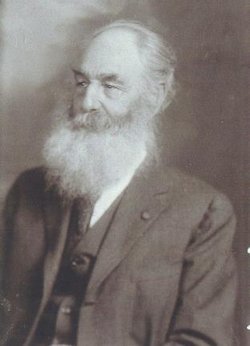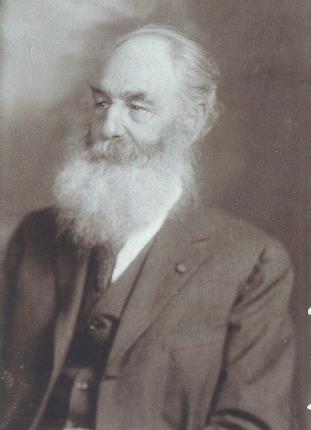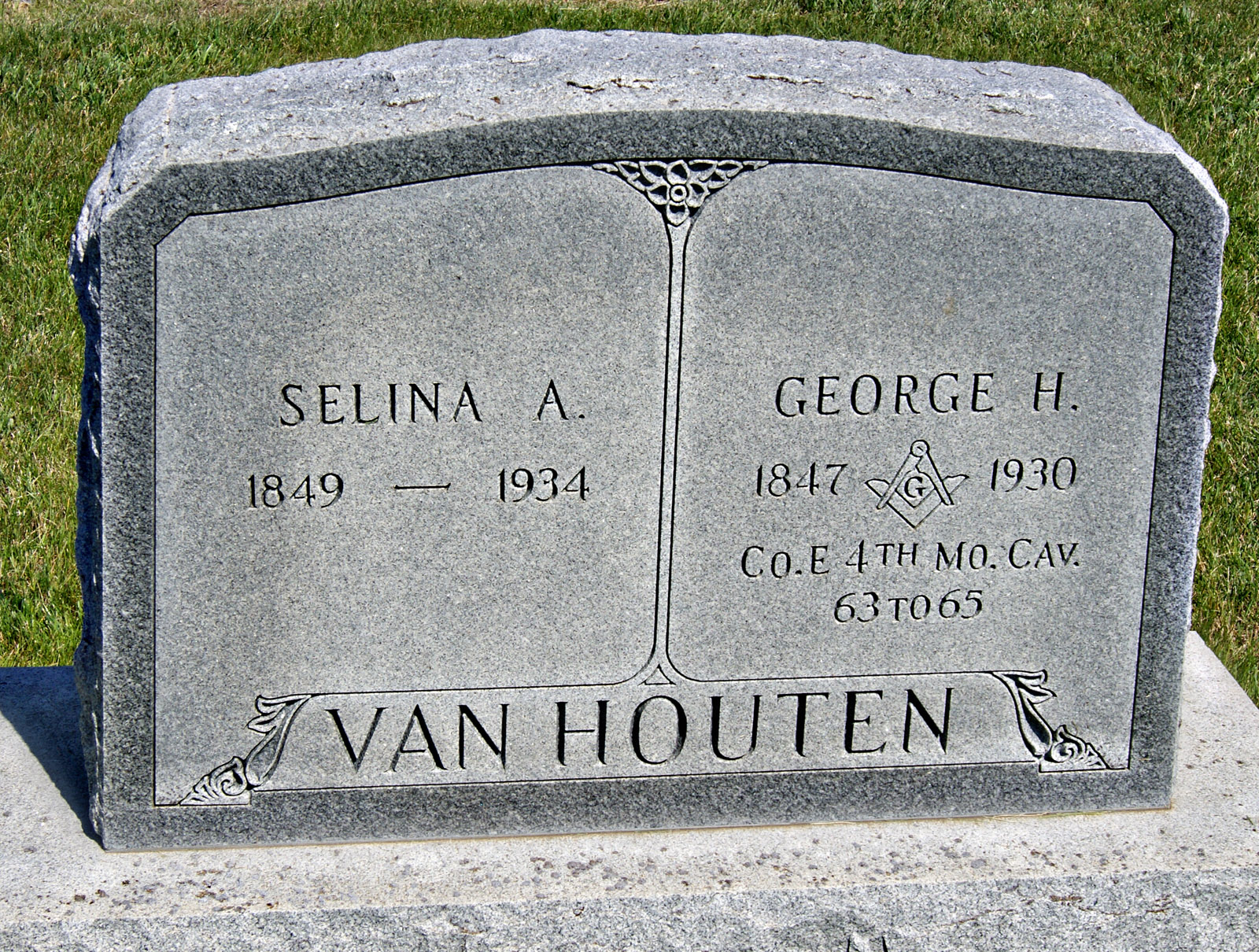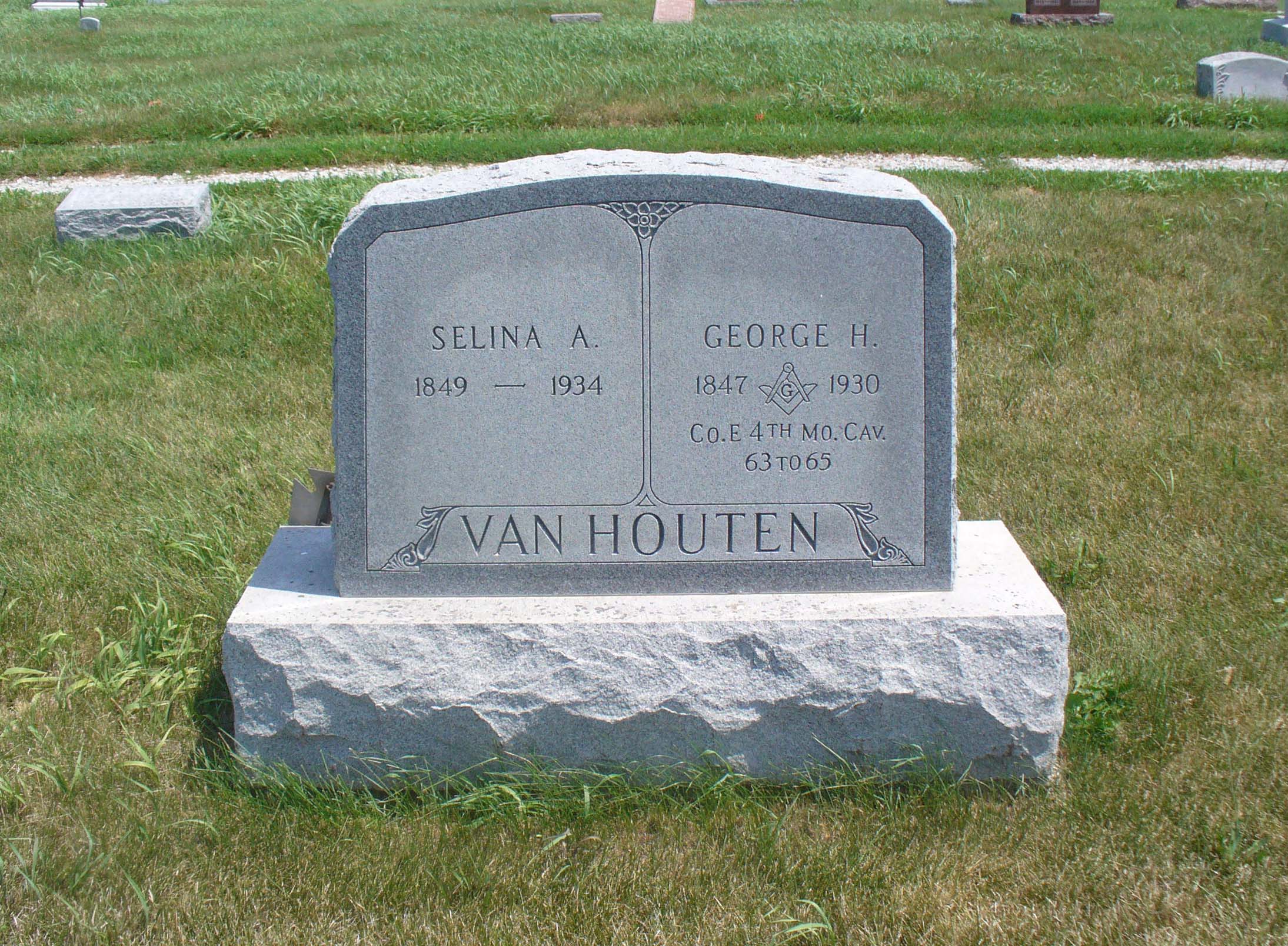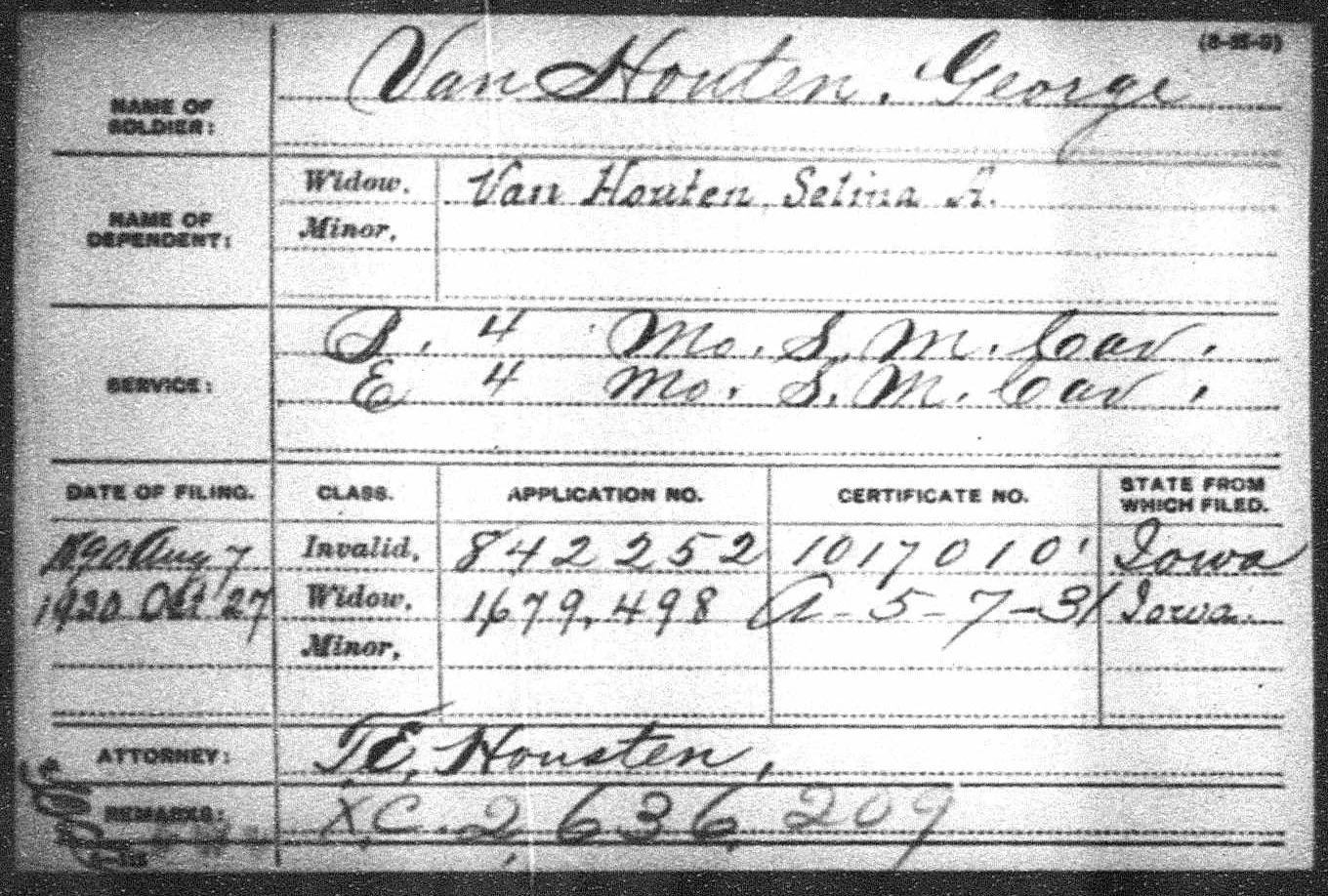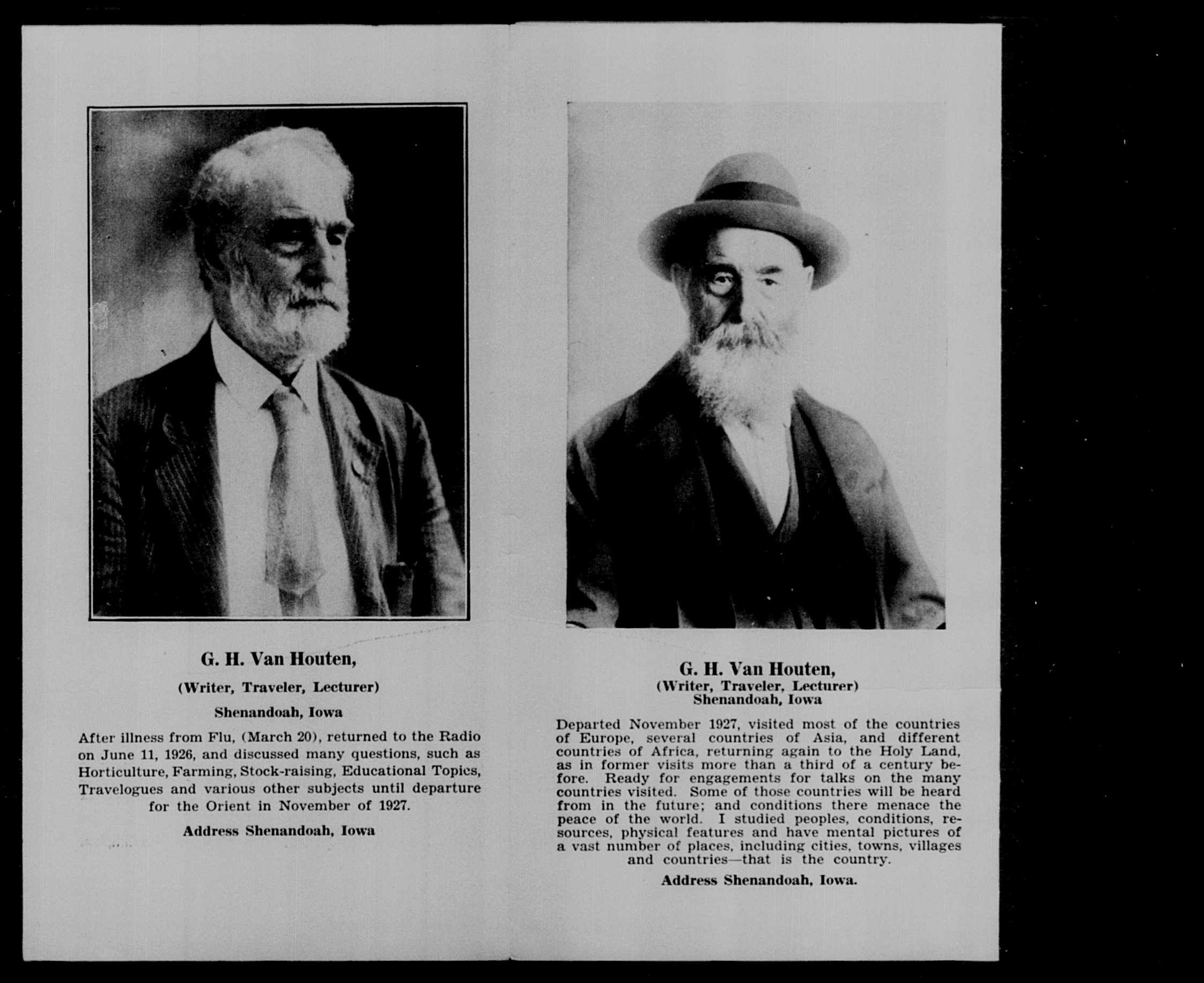His father was John Henry Van Houten and his mother 's maiden name was Elizabeth Ann Kent. In 1846 the family came to Iowa and settled near Middle River about five miles east of Winterset in Madison county. In 1850 removed to Cass County, settling about two miles northwest from Lewis, the county seat. In the Fall of 1863 the family came to Taylor county, first about a miles west from the site of the present town of Gravity, then three miles southwest from what was later the town of Lexington and when the latter town started the family located about one and one fourth miles northeast from the present Lexington cemetery, where their father continued his trade as wagon maker. But the feed for winter having been garnered, there being few bridges and few transportation facilities, Dick was left at the Cass county farm with his brother to help care for the livestock and to bring them to Taylor county in the spring of 1855. There were few schools and as an additional misfortune an almost fatal attack of measles that impaired his eyesight and left him in frail health for [several] years. He spent but a few months in school, the last being when he took his 2 oldest children with him on one horse where he later became the teacher.
He was in the Civil War.
At the age of twelve years, [following] the faith of his ancestors, he became an ardent republican and abolitionist and [during] the war volunteered his services six times before he was accepted, becoming a private in Company E (later Company Consolidated Detachment) 4th Mo. Cavalry, Missouri State. He was mustered into the States service at Sedalia, Missouri, January 5, 1864 and honorably discharged at St. Joseph, July 5, 1865. At the Battle of [?]Blue, near Kansas City, his company was so fiercely engaged that all its officers were killed.
The boy had been granted the satisfaction of following his father and older brother to the cause of the Union and of seeing his democratic relatives [the] loyal supporters of Abraham Lincoln.
At the close of the war he attended school a few weeks, then became a freight wagon driver from Omaha, Nebraska to Julesberg, Colorado, earning additional compensation as company [?]
October 23, 1866 he married Selina A. Jenks, a playmate of childhood days, and built a log cabin within six miles of the present site of Lenox, near the banks of the Hundred and Two where they made their home. Later they bought and improved the west part of what is now known as the Griffith farm, then the land known as the Hoover farm.
Though they raised their children to maturity, the pioneer couple, with typical pioneer sympathies, helped [raise] eight orphans.
He Held Many Public Offices.
Mr. Van Houten has been a live stock raiser, nurseryman, newspaper publisher, lecturer. He was county [treasurer?] 1884=1885, was once [?] of Lenox; secretary of the Southwestern Iowa Horticultural society for many years, and secretary of Iowa State Horticultural Scoeity, secretary of Iowa Agricultural Society and State department of agriculture for three years during which time the state fair which was largely under his management became a success, and was once secretary of the American Association of Fairs and Expositions.
He served as a member of the House of Representatives in the 26th, 27th and 32nd General Assemblies, where he became well known as a parliamentarian.
In 1891 he was the republican candidate for lieutenant governor. His running mate for governor could not make a public address and was frequently challenged by the democratic candidate to discuss the issues of the campaign in joint debate, to which Mr. Van Houten would replay with a like challenge; but the republican candidate had the reputation of being one of the best extemporaneous speakers in the country and Governor Bois would never accept. The republicans were defeated because they advocated prohibition, the candidate for governor running behind more than 8000 votes; while the candidate for lieutenant governor was defeated by less than 2300, carrying the 8th congressional district, where he and his opponent both resided.
Served Abroad
In 1893 Mr. Van Houten went to the Hawaiian Islands, and his ability to make confidential friends was apparent when President Sanford B. Dole, and Marshal E. G. Hitchcock employed him in the secret service to watch the deposed queen Liliuokalani and her followers and at one time left him in command of the Provincial Government Army.
In 1896 he was sent to Nebraska by the National Republican Central Committee in the presidential campaign in which W. J. Bryan was first defeated for the presidency.
He was a special agent of the United States Treasury Department in Alaska for twenty-eight months 1902-1904, acquired a large tract of land in Saskatchewan, Canada, in 1905 and another large tract at South Bay, near Bellingham Washington in 1909.
He made a trip around the world in 1895, again visited the Hawaiian Islands in 1924; made a trip to Asia, Europe and Africa in 1927 when more than 80 years of age, and has made a great many trips to Canada and Mexico.
Mr. Van Houten and H. Lupton owned the Lenox Time-Table in 1874, and he owned it and published it alone in 1889 and published it alone in 1889- 1890. He owned and published the Industrial Record and Argus, in Bedford and the Rural Northwest in Des Moines. He has been a contributor to many other newspapers. The New Times, later consolidated with the Lenox Time-Table, was the last newspaper he owned and published.
He belonged to the Consistory at Des Moines. In its day the Excelsior Grange, southwest of Lenox, was organized by his assistance and membership. He helped to organize the first Sunday school in Lenox, which was held in the old Burlington and Missouri River railroad depot. The Methodist Episcopal church, the Masons, Independent Order Odd Fellows, Knights of Pythias, Good Templars, Order of Eastern Star, Sons of Veterans and Grand Army of the Republic, of Lenox, each numbered him as a charter member. He was colonel of the Iowa Division of Sons of Veterans in 1891-1892.
In recent years he has been employed as a lecturer on KMA and KFNF radio stations at Shenandoah, Iowa.
His widow; one brother, Oscar, Yakima, Washington; four sons, M. B., and V., Bellingham, Washington; W. C., Lenox Iowa; A. W., Davenport, Iowa; four daughters, Marge Barrans, Lenox, Iowa; Abi L. Dawson, Veradale, Washington; Bessie McElhern, Marysville, California; Clara Myrtle Boyer, Creston, Iowa; Mary D. Bell, Bellingham, Washington; twenty-four grand children; and fifteen great grand children survive. One son, O. C., and two daughters, Darthula Buckner and Bertha M. Peak, have preceded him in death.
Funeral services were held at the Methodist church in Lenox, 2:30 p. m., Sunday, October 19, conducted by Rev. Floyd L. Shepherd, after which a short Masonic service was held at the grave.
The body was accompanied all the way to its last resting place by the colors, in charge of the American Legion, and was accorded military honors. Bugler John Swap of Cpmpany B, 51st Iowa Volunteer Infantry in the Spanish-American War, a son a veteran whose parents were intimate friends of the Van Houten and Jenks families before the days of the War of the Rebellion, sounded taps, with an echo by F. G. Titze.
[The obituary is printed on the edge of the newspaper and many of the words are missing in the fold.]
Lenox Time Table, Lenox, Iowa Thursday October 23, 1930
His father was John Henry Van Houten and his mother 's maiden name was Elizabeth Ann Kent. In 1846 the family came to Iowa and settled near Middle River about five miles east of Winterset in Madison county. In 1850 removed to Cass County, settling about two miles northwest from Lewis, the county seat. In the Fall of 1863 the family came to Taylor county, first about a miles west from the site of the present town of Gravity, then three miles southwest from what was later the town of Lexington and when the latter town started the family located about one and one fourth miles northeast from the present Lexington cemetery, where their father continued his trade as wagon maker. But the feed for winter having been garnered, there being few bridges and few transportation facilities, Dick was left at the Cass county farm with his brother to help care for the livestock and to bring them to Taylor county in the spring of 1855. There were few schools and as an additional misfortune an almost fatal attack of measles that impaired his eyesight and left him in frail health for [several] years. He spent but a few months in school, the last being when he took his 2 oldest children with him on one horse where he later became the teacher.
He was in the Civil War.
At the age of twelve years, [following] the faith of his ancestors, he became an ardent republican and abolitionist and [during] the war volunteered his services six times before he was accepted, becoming a private in Company E (later Company Consolidated Detachment) 4th Mo. Cavalry, Missouri State. He was mustered into the States service at Sedalia, Missouri, January 5, 1864 and honorably discharged at St. Joseph, July 5, 1865. At the Battle of [?]Blue, near Kansas City, his company was so fiercely engaged that all its officers were killed.
The boy had been granted the satisfaction of following his father and older brother to the cause of the Union and of seeing his democratic relatives [the] loyal supporters of Abraham Lincoln.
At the close of the war he attended school a few weeks, then became a freight wagon driver from Omaha, Nebraska to Julesberg, Colorado, earning additional compensation as company [?]
October 23, 1866 he married Selina A. Jenks, a playmate of childhood days, and built a log cabin within six miles of the present site of Lenox, near the banks of the Hundred and Two where they made their home. Later they bought and improved the west part of what is now known as the Griffith farm, then the land known as the Hoover farm.
Though they raised their children to maturity, the pioneer couple, with typical pioneer sympathies, helped [raise] eight orphans.
He Held Many Public Offices.
Mr. Van Houten has been a live stock raiser, nurseryman, newspaper publisher, lecturer. He was county [treasurer?] 1884=1885, was once [?] of Lenox; secretary of the Southwestern Iowa Horticultural society for many years, and secretary of Iowa State Horticultural Scoeity, secretary of Iowa Agricultural Society and State department of agriculture for three years during which time the state fair which was largely under his management became a success, and was once secretary of the American Association of Fairs and Expositions.
He served as a member of the House of Representatives in the 26th, 27th and 32nd General Assemblies, where he became well known as a parliamentarian.
In 1891 he was the republican candidate for lieutenant governor. His running mate for governor could not make a public address and was frequently challenged by the democratic candidate to discuss the issues of the campaign in joint debate, to which Mr. Van Houten would replay with a like challenge; but the republican candidate had the reputation of being one of the best extemporaneous speakers in the country and Governor Bois would never accept. The republicans were defeated because they advocated prohibition, the candidate for governor running behind more than 8000 votes; while the candidate for lieutenant governor was defeated by less than 2300, carrying the 8th congressional district, where he and his opponent both resided.
Served Abroad
In 1893 Mr. Van Houten went to the Hawaiian Islands, and his ability to make confidential friends was apparent when President Sanford B. Dole, and Marshal E. G. Hitchcock employed him in the secret service to watch the deposed queen Liliuokalani and her followers and at one time left him in command of the Provincial Government Army.
In 1896 he was sent to Nebraska by the National Republican Central Committee in the presidential campaign in which W. J. Bryan was first defeated for the presidency.
He was a special agent of the United States Treasury Department in Alaska for twenty-eight months 1902-1904, acquired a large tract of land in Saskatchewan, Canada, in 1905 and another large tract at South Bay, near Bellingham Washington in 1909.
He made a trip around the world in 1895, again visited the Hawaiian Islands in 1924; made a trip to Asia, Europe and Africa in 1927 when more than 80 years of age, and has made a great many trips to Canada and Mexico.
Mr. Van Houten and H. Lupton owned the Lenox Time-Table in 1874, and he owned it and published it alone in 1889 and published it alone in 1889- 1890. He owned and published the Industrial Record and Argus, in Bedford and the Rural Northwest in Des Moines. He has been a contributor to many other newspapers. The New Times, later consolidated with the Lenox Time-Table, was the last newspaper he owned and published.
He belonged to the Consistory at Des Moines. In its day the Excelsior Grange, southwest of Lenox, was organized by his assistance and membership. He helped to organize the first Sunday school in Lenox, which was held in the old Burlington and Missouri River railroad depot. The Methodist Episcopal church, the Masons, Independent Order Odd Fellows, Knights of Pythias, Good Templars, Order of Eastern Star, Sons of Veterans and Grand Army of the Republic, of Lenox, each numbered him as a charter member. He was colonel of the Iowa Division of Sons of Veterans in 1891-1892.
In recent years he has been employed as a lecturer on KMA and KFNF radio stations at Shenandoah, Iowa.
His widow; one brother, Oscar, Yakima, Washington; four sons, M. B., and V., Bellingham, Washington; W. C., Lenox Iowa; A. W., Davenport, Iowa; four daughters, Marge Barrans, Lenox, Iowa; Abi L. Dawson, Veradale, Washington; Bessie McElhern, Marysville, California; Clara Myrtle Boyer, Creston, Iowa; Mary D. Bell, Bellingham, Washington; twenty-four grand children; and fifteen great grand children survive. One son, O. C., and two daughters, Darthula Buckner and Bertha M. Peak, have preceded him in death.
Funeral services were held at the Methodist church in Lenox, 2:30 p. m., Sunday, October 19, conducted by Rev. Floyd L. Shepherd, after which a short Masonic service was held at the grave.
The body was accompanied all the way to its last resting place by the colors, in charge of the American Legion, and was accorded military honors. Bugler John Swap of Cpmpany B, 51st Iowa Volunteer Infantry in the Spanish-American War, a son a veteran whose parents were intimate friends of the Van Houten and Jenks families before the days of the War of the Rebellion, sounded taps, with an echo by F. G. Titze.
[The obituary is printed on the edge of the newspaper and many of the words are missing in the fold.]
Lenox Time Table, Lenox, Iowa Thursday October 23, 1930
Family Members
-
![]()
David Van Houten
1833–1895
-
![]()
Peter Van Houten
1839–1911
-
John J. Van Houten
1841–1860
-
![]()
James Van Houten
1849–1853
-
![]()
Darthula Van Houten Bowerman
1851–1867
-
![]()
Melvina Van Houten
1853–1853
-
![]()
Breckenridge Van Houten
1855–1855
-
![]()
Buchanan Van Houten
1855–1856
-
![]()
Oscar W. Van Houten
1858–1948
-
Benjamin Van Houten
1861–1862
-
![]()
Darthula B Van Houten Buckner
1867–1914
-
![]()
Ozro C "OC" Van Houten
1870–1928
-
![]()
Marge A Van Houten Barrans
1871–1959
-
![]()
Martel B Van Houten
1873–1960
-
![]()
Vernom E Van Houten
1876–1937
-
![]()
Walter Conrad Van Houten
1878–1936
-
![]()
Arthur W Van Houten
1881–1974
-
![]()
Bertha Maude Van Houten Peak
1883–1910
-
![]()
Abi Louisa Van Houten Dawson
1885–1984
-
![]()
Bessie Bell Van Houten Leonard
1888–1972
-
![]()
Claire Myrtle Van Houten Boyer
1890–1949
-
![]()
Mary Dee Van Houten Bell
1893–1982
Sponsored by Ancestry
Advertisement
Advertisement
